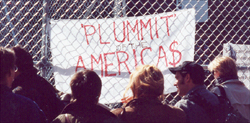|
Taking to the streets...and the shareholders' meetings: Club activists take a fresh look at how to influence corporate behavior.
Club Mounts Challenge to Corporate Power
In 1998, Wayne Township in Mifflin County, Pa., passed a "three strikes and you're out" law prohibiting corporations that have committed three regulatory violations over a 20-year period from doing business there. The rule has already kept some hog-factory operators from moving in.
The same year, New York Attorney General Dennis Vacco revoked the state charter of the Council for Tobacco Research. He argued that the council was abusing its tax-exempt status by serving as a propaganda arm of the tobacco industry. Vacco's successor, Eliot Spitzer, proposed a "death penalty" for corporations that cause serious harm; he said he would not hesitate to revoke charters of corporate criminals.
 The Sierra Club was not involved in those actions, but it will be in the thick of similar challenges in the coming years - if Ruth Caplan, Jim Price and other members of the Club's Corporate Accountability Committee have anything to say about it. And they do. The Sierra Club was not involved in those actions, but it will be in the thick of similar challenges in the coming years - if Ruth Caplan, Jim Price and other members of the Club's Corporate Accountability Committee have anything to say about it. And they do.
Corporations have too much power, says Caplan, who chairs the CAC, and that makes it harder to hold them accountable for their impact on the environment. Too often, she says, they dominate the regulatory and legislative bodies that are supposed to monitor them.
Until now, most of the Club's corporate accountability work has involved shining the spotlight on "rogue" corporations, like General Electric, which dumped PCBs in the Hudson River, or as is the case with the concentrated animal feeding operations, an entire industry.
Caplan says the Club is trying to look beyond the behavior of corporations and challenge the underlying rules that give them their power.
"We have public policy tools," she says. "We need to develop and learn how to use a comparable set of corporate accountability tools." Those tools could include charter revocations, shareholders actions (see Sleeping With the Enemy), corporate tax reform, boycotts and purchasing advisories.
Caplan is currently fighting a proposed expansion of corporate power. She is working alongside Dan Seligman of the Club's Responsible Trade Program to prevent the investor lawsuit provisions of the North American Free Trade Agreement from being included in the proposed Free Trade Area of the Americas. The NAFTA provisions give corporations the power to sue governments if their laws interfere with a company's profitability. Already, Methanex, a Canadian chemical company, has sued the U.S. government for nearly $1 billion in damages to compensate for lost profits because California has ordered a phase-out of a gasoline supplement that pollutes drinking water.
 |
Corporations have expanded their power through trade pacts that allow them to sue governments that interfere with profitmaking. In April, the Club sent a delegation to Quebec to fight against such provisions. |
While reducing corporate power may be a daunting challenge, Caplan is optimistic. "You create change because you don't accept what is as inevitable. The Senate has passed campaign finance reform. We stopped the Multilateral Agreement on Investment. We can stop the FTAA."
Jim Price, the Club's Southeast regional staff director and liaison to the Corporate Accountability Committee, says it's important to remember that corporations haven't always enjoyed such power.
The first U.S. corporations were set up after the American Revolution, which was, in part, a rebellion against the crown corporations of England. Corporations were granted limited duration back then - 10 years, 20 years, not forever, as is mostly the case today. States had broad rights to amend or revoke the charters. During the 19th century, Michigan, Ohio and New York revoked the charters of oil, sugar and whiskey companies that broke the law or exceeded the power of their charter.
As corporations have grown in size and power, the ability of state, national and even international bodies to hold them in check has diminished. Their growing dominance was helped along by a number of influential court cases, the most significant of which defined corporations as "legal persons."
In an 1886 landmark case, Santa Clara v. Southern Pacific Railroad, the U.S. Supreme Court took provisions of the 14th Amendment, which was drafted to protect freed slaves, to give corporations the "rights of natural persons." Before that decision, a corporation could not exercise First Amendment rights to lobby public officials or contribute to political campaigns. The ruling also allowed corporations to claim freedom against unreasonable search and seizure to withhold information about activities that were potentially harmful to the public.
Sixty years later, Supreme Court Justice William O. Douglas stated that "there was no history, logic or reason to support that view."
But while corporations were granted the rights of personhood, their officers have largely been shielded from punishment for criminal or civil wrongdoing.
The legal right to challenge charters still exists in most states, though it is rarely exercised.
Only in the past few years have activists begun learning about and using this potentially powerful tool, what California attorney Robert Benson, who led a challenge against Unocal Corporation, calls "a well-kept legal secret."
"The people mistakenly assume that we have to try to control these giant corporate repeat offenders one toxic spill at a time, one layoff at a time, one human-rights violation at a time," he says. "But the law has always allowed the attorney general to go to court to simply dissolve a corporation for wrongdoing....Baseball players and convicted individuals in California get only three strikes. Why should big corporations get endless strikes?"
In 1998, Benson represented 30 individuals and organizations in a petition to California Attorney General Dan Lungren urging him to challenge Unocal's charter, citing the company's environmental and human-rights violations, most notably its use of forced labor to build a pipeline in Burma. (The petition also cited the company's collaboration with the Taliban in Afghanistan on a proposed gas pipeline.)
Neither Lungren nor his successor Bill Lockyer has acted on the petition.
In Alabama, where a private citizen can file a petition to dissolve a corporation abusing its charter, Circuit Court Judge William Wynn - acting as a citizen, not a judge - challenged the charters of five tobacco companies.
State law forbids corporations that have broken the law from engaging in business in Alabama, says former Alabama Chapter Chair Peggie Griffin. The chapter filed a friend-of-the-court brief in support of Wynn's petition. Although the suit was not for monetary damages, it was dismissed on the grounds that a national lawsuit had already addressed the monetary damages caused by tobacco companies.
Over the past five years, Price has led dozens of workshops sharing these tools and educating citizens about corporate abuse of power. More recently, other members of the Corporate Accountability Committee, including New York attorney John Klotz and Sierra Club of Canada liaison Janet Eaton, have led workshops as well.
Price cautions that these corporate tools must be integrated with grassroots activism. He paraphrases Ward Morehouse from the Program on Corporations, Law and Democracy, who led efforts to sue Union Carbide after the explosion in Bhopal, India: "You only make progress inside the courtroom commensurate with the sounds outside the doors of the chamber."
For more information about the CAC's work or to inquire about a corporate accountability workshop in your community, contact Ruth Caplan at (202) 244-0561; rcaplan@igc.org or Jim Price at (205) 933-9111; jim.price@sierraclub.org.
Read more: Sleeping With the Enemy
Up to Top
|